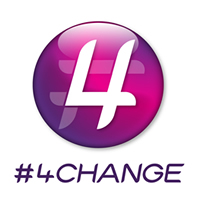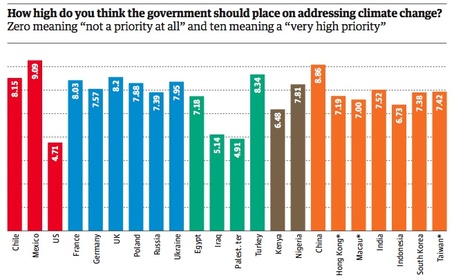I've been meaning to write a wrap-up of the #4change chat on collaboration for the week since it happened. My apologies for the delay, I'm still getting into the routine of blogging and Burning Man preparation has completely taken over ever available hour outside of work and a necessary minimum of socializing. I'll tell you all about it before I depart – in a week! Anyway....
Thank you to @lethalsheethal for her excellent and vastly more timely reflection on the chat. Having just discovered it I'd like to recommend www.printyourtwitter.com as creating by far the most digestible (and printable, naturally) twitter transcript (ht @writerpollock).
The topic of the most recent #4change chat was “How does social media open new doors for collaboration?” It was a vibrant and thought-provoking conversation, in my opinion the best #4change chat we've had so far.
There is no question that social media has created enormous new collaborative possibilities. Some of these are in the sharing of data, such as the Social Entrepreneurship API being developed by Social Actions and the merging of the North American green business databases of Gen Green (@gengreen) and 3rd Whale (@3rdwhale), which was announced at the start of the chat. This was interesting and welcome news, but business alliances of this type are not uncommon. What, we wondered, where the unique collaborative capacities of social media?
@engagejoe summed up some of these possibilities as “exposing overlap, sharing resources, connecting communities, forging partnerships.” These things are not unique to social media but they are native to it – social media makes overlap and waste more transparent, speeds up information sharing and relationship-building and can increase the impact of collaborations. Messages can be shared between communities and networks both real-time and ad-hoc. And as #4change itself demonstrates conversations can be convened that were never possible before.
But how much of this is happening? And if these possibilities are not being realized what are the barriers standing in the way?
The conversation part seems easiest. It is, by definition, what social media facilitates. Making this conversations intentional, productive and constructive is harder, but we still see examples of this all around us, on forums and wiki's, blogs and microblogs, communities closed and open. These conversations can create new insights, understanding and relationships. And these conversations can lead to concrete action, from protests to petitions, fundraising to collaborative databases.
There was a real skepticism felt by some in the conversation about whether real work was being done online. This, of course, depends on what real work is to you, but most would agree that hearts and minds are a key part of most forms of social change and so anything that brings us into contact with each other in new ways has the ability to move us in new ways. As Michael Wesch said in his presentation at Personal Democracy Forum this year, “We know ourselves through our relationships with others. New media is creating new ways to relate.”
But to really scale-up the collaborative possibilities of social media we need to empower and lead our organizations to work together in new ways. As @ChristinasWorld said: “if we could get orgs and passionate people to start working together at a sector/issue level things will start to get exciting.” One key challenge to doing this, as @edwardharran pointed out, is that “social media is pocketed in silos.” While we might wish that this wasn't the case it is simply a fact of human existence that we build groups at all sizes, but that our closest communities are smaller and more digestible, whether on or offline (although the scale of what's digestible varies widely between these two states). With these distributed, frustratingly uncoordinated conversations also comes enormous space for innovation and creative thinking. However better search, aggregation and distribution is needed to reveal these conversations to each other in ways that support collaboration. We can see steps in this direction with WiserEarth groups showing related groups and Zanby which allows groups to connect while retaining their independence.
A schema began to emerge from the conversation which identified three distinct types of collaboration:
1. organization-to-organization
2. organization-to-individuals
3. individuals-to-individuals.
Again and again the majority of the examples brought up where the later two. For 2. you have organizations like the Sunlight Foundation who are harnessing the contributions of hundreds of coders to create their transparency tools and OneYoungWorld who are using social media to find 1500 leaders of tomorrow. You also have new tools which facilitate this form of collaboration in exciting new ways like The Extraordinaries. For 3. there are grassroots political fundraising campaigns and the entire open source movement.
(4. was also later suggested by @engagejoe: people-within-organizations. Any more?)
For 1. there is the previously-cited Social Actions-style data aggregation and sharing and some great examples of organizations collaborating around a social media-enabled campaign, such as the just-launched climate change campaign tcktcktck (@tcktcktc) but there was a clear feeling that much of this landscape remains to be filled out.
In discussing the barriers to better social media collaboration between non-profits people nominated time intensity vs staffing resources, fear, lack of connectivity in many parts of the world, desire to tightly control their message, geography and time zones and lack of skills as prime candidates. The need for clear strategy so as to not waste precious staff resources was also mentioned, along with the observation that many non-profits do not have the knowledge or experience to develop this strategy.
To close people were asked for their key takeaways from the conversation:
- “There is a desire to evolve toward more collaborative outputs; SM [social media] may not be enough to get there” - @ChristinasWorld
- “It's given me ideas about the barriers NP [non-profits] face with SM” - @chilli07
- “I think #4change in itself is a great example of international collaboration” - @tashjudd
- “Main takeaway: a sense of optimism. SM is not going anywhere and collaboration is only going to continue to get bigger and better” - @edwardharran
- “SM can be chaotic but still work” - @zerostrategist
- “I now see more kinds of collaboration: people-within-org, org-to-community, community-to-community, org-to-org” - @engagejoe
And if I could be so bold as to end on my own takeaway:
- “We must learn to collaborate as individuals first, then teach our organizations how.”
-------------------------------------------------------------------------------------
Please let us know what topics you'd like to cover in future chats!

